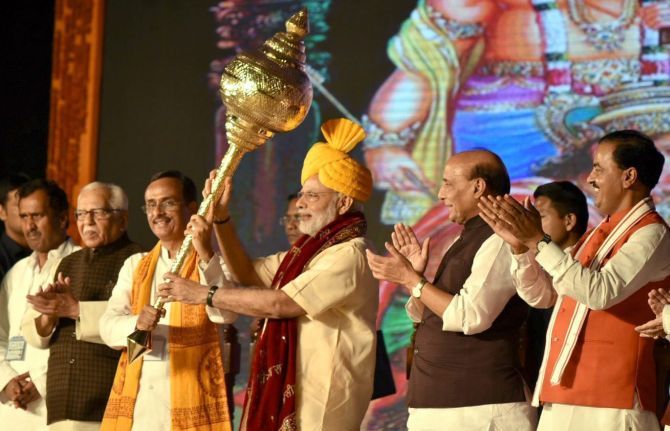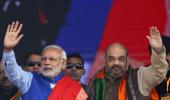Confident of victory, the BJP has begun identifying officers who can 'rid' the administration of the SP-BSP 'hangover', reports Radhika Ramaseshan.

It is that time of 2016 when Uttar Pradesh's officialdom is not looking at year-end destination breaks.
The elections are a little more than a month away and the pre-poll scenario seemed "muddled" by the reckoning of Lucknow's establishment, which otherwise has a finger on the popular pulse ahead of pollsters.
Nobody is sure if a new regime will be seated in by March or the old order will continue.
The farthest that the bureaucracy wagers is that Chief Minister Akhilesh Yadav's image remains "unsullied" despite him being buffeted by family feuds,
Mayawati's "proven" record as an "able administrator" places her as a serious contender while the Bharatiya Janata Party's prospects seem iffy after demonetisation.
The BJP's counter to this calculation is that UP's officials have been "thoroughly spoilt" by the Samajwadi Party and Bahujan Samaj Party governments and are "afraid" their party will bring in a dispensation that will, as a state leader puts it, "sweep the house clean of unwanted elements with a long broom."
Expectedly, the political aftermath of demonetisation is the buzz as some apparatchiks wait their turn to call on one of the state's most influential bureaucrats, currently working out of home, following a serious accident.
Navneet Sehgal, an IAS officer of the 1988 batch, matters so much to Chief Minister Akhilesh Yadav (as he did to Mayawati) that at an elite Holi do in 2016, he earned the sobriquet of being a 'man for all seasons.'
The view emerging is that while the BJP had engineered a social coalition of the backward and the upper castes with support from sections of the Dalits, and, therefore, ranked high in the sweepstakes a couple of months ago, 'note bandi' has taken away the initial advantage.
One stray voice among the callers lauded Prime Minister Narendra Modi for his "radical" move and his "commitment towards minimising the rich-poor divide."
The rest carped about being denied the "fundamental right" to withdraw one's money in banks and spend it the way they wanted.
Those with a rural connect spoke of the travails suffered by farmers in the rabi sowing cycle for want of cash to purchase seeds and fertilisers, cancelled weddings and hurried cremations. And warned the "personal sufferings" would impact the BJP's prospects.
Uttar Pradesh officialdom's belief is that either Akhilesh, with his image 'unsullied' by the Yadav clan's feuds, will return to power or hand over the reins to BSP leader Mayawati.
"If law and order and the incidence of crimes are played up against the SP, then Mayawati has the best chance of returning because she is remembered as a tough administrator," an official said.
A senior BJP functionary dismissed the bureaucracy's speculations as "wishful thinking."
"The administration has seen how tough BJP governments were in the past," he said, recalling that in 1997, when Kalyan Singh replaced Mayawati as chief minister mid-term, within his first 13 days, he shunted out 188 Indian Administrative Services and Indian Police Service officers on suspicion that they were handpicked by Mayawati notwithstanding their 'dubious' antecedents.
To hammer home the point about Singh's 'probity', the BJP worker said he reinstated "honest" officers like Neeta Chaudhary, Dinesh Singh and Brijesh Singh, who were given short shrift by Mayawati for not doing her bidding.
Confident of victory, the BJP has begun identifying officers who can take the process of demonetisation and a cashless economy to conclusion and "rid" the administration of the SP-BSP "hangover".
However, Lucknow's establishment is not so much about "honesty" or lack of it as it has the predilection to develop political loyalties with time.
The tendency was markedly manifest after Dalits emerged as a strong pillar of the administration that used to be held up by Brahmins and Kayasthas.
When Mayawati became chief minister for the first time in 1995, with the BJP's support, to her ally's chagrin, she relied principally on Dalit officers.
Some of them remained faithful to her while others who found her "mercurial" parted ways to join politics after retirement.











